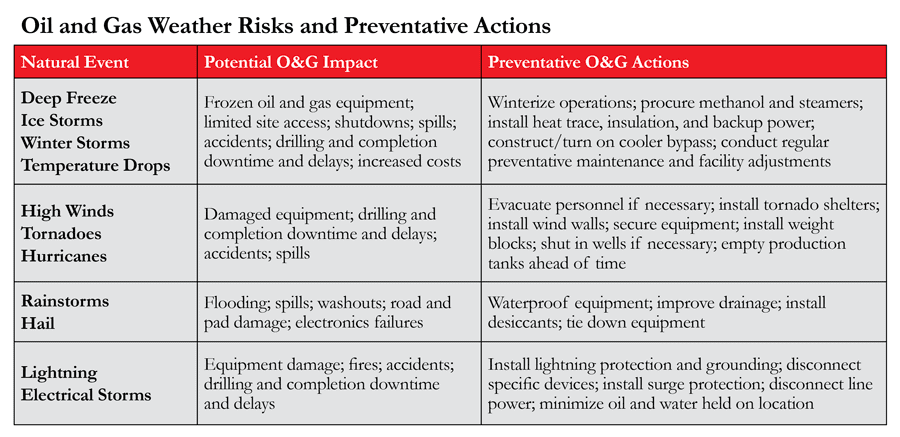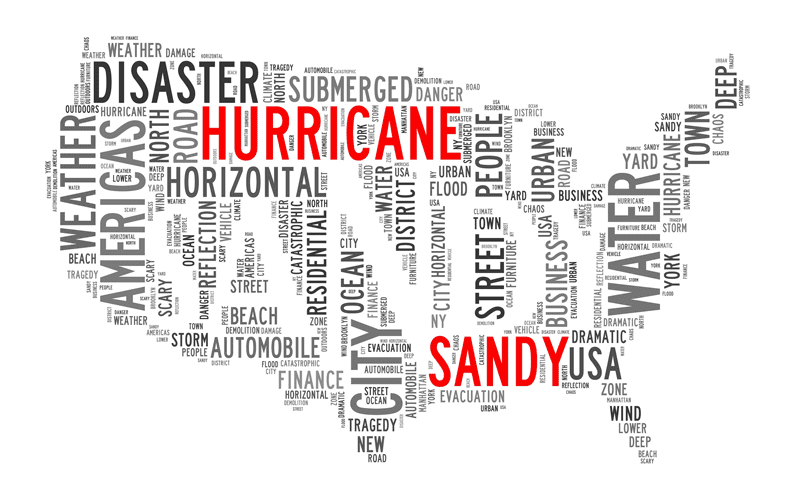With oil and gas assets and infrastructure continuously exposed to the elements, extreme weather events periodically wreak havoc in the oil patch. February’s Winter Storm Uri became the costliest winter storm on record, with freezing infrastructure across states, from Nebraska to the Texas Gulf Coast, resulting in a hefty price tag of approximately $20.4 billion. An ill-prepared oil and gas company could suffer a knockout punch from costly business interruptions, reputational damage, executive resignations and exposure to potential legal liability. Civil lawsuits against local utilities and gas companies assert claims ranging from wrongful death to property damage to contract breach. Such lawsuits can take years to resolve, and their long-lasting implications can result in significant financial losses and even bankruptcy.
Companies facing potential liability for an extreme weather-related incident often seek refuge in the Acts of God defense. Evoking the notions of inevitability and superior forces beyond human control, the Acts of God defense is tightly woven into the canvas of American jurisprudence. The Acts of God doctrine has been used to avoid environmental, contractual and/or tort liability associated with extreme, unforeseeable and unavoidable natural disasters and extreme weather. Though the exact parameters of the doctrine differ from jurisdiction to jurisdiction, three requirements remain fairly consistent: 1) The natural event must be of such unexpected/unprecedented character as to be unforeseeable; 2) The damage must result solely from the event; and 3) The exercise of ordinary care or reasonable precautions could not have prevented the damage. The Acts of God doctrine also has been codified in several federal environmental statutes, allowing entities to avoid liability for release of hazardous materials and cleanup, provided the requirement that the damage be caused solely by an Act of God is satisfied.
Useful as it is, the Acts of God defense has its limits. First, in today’s world, it is becoming increasingly difficult to claim lack of foreseeability with respect to any particular severe weather event. Modern technology and improved computer forecasting capabilities have enhanced the accuracy of weather forecasts, enabling various industries to plan and execute “weather-sensitive operations,” while ensuring the safety of people and assets. In fact, growing demand for weather forecasting is one of the driving factors for projected growth of the weather forecasting services market size from an estimated $1.5 billion in 2020 to $2.3 billion by 2025, with the energy sector accounting for the largest share.
Second, the Acts of God defense will not apply if a party invoking it was concurrently negligent and failed to take necessary precautions, thereby exacerbating the damage. If a severe weather event was foreseeable and some reasonable precautionary measures could have reduced the damage and yet a party chose to do nothing, that party will likely be unsuccessful in claiming the Acts of God defense.
Although some weather-related events will be so ruinous that damages will be inevitable, regardless of what precautionary measures a company implements, it is not an excuse to do nothing.
Leadership should consider the following five steps to minimize potential liability for weather-related risks:
1. Identify Relevant Weather Risks
Geographic location of company’s assets and operations determines what types of weather- related risks will be the most impactful. For instance, operations in the West may be impacted by wildfires, whereas operations in the Midwest may be impacted by severe winter storms. Identifying these location-specific risks will allow energy companies to prioritize their efforts and focus on taking reasonable precautions against the most impactful risks.

2. Conduct Regular Site and Equipment Inspections
Continuous exposure to the elements puts significant stress on energy production and distribution equipment and increases the possibility of failure during a severe weather event. Conducting regular physical site and equipment inspections will ensure that any potential issues are identified and addressed ahead of time. This practice will also help improve weather resilience of existing assets and will allow [the company] to tailor a list of necessary preventative actions for the company’s specific assets and operations.
3. Prepare a Severe Weather Action Plan
Planning and preparation are necessary to minimize negative impact from potential severe weather. For example, if the company’s well sites are located in an area with a history of severe winter storms, that company will need to winterize its equipment and put contracts in place with those vendors who will assist with any other required preparations before temperatures begin to drop. Conducting due diligence with respect to vendors and placing them on the approved vendor list can take time. Additionally, it may be a good idea to have as many approved vendors as possible for a particular service or product to ensure there are no supply chain interruptions.
4. Incorporate Weather Awareness into Overall Safety Culture
Incorporating weather awareness and preparedness into a company’s overall safety culture and providing regular relevant training allows a company to equip its personnel with the skills necessary to identify and properly respond to weather-related hazards. It also encourages personnel to be more proactive. Strong safety culture, with an appropriate focus on weather-related risks, is vital to business resilience and continuity.
5. Know Your Contractual Obligations
When a severe weather event occurs, some business interruptions will be inevitable, affecting a company’s ability to comply with its contractual obligations. Weather-related business interruptions are typically addressed in the contract’s force majeure clause or similar contractual provision that excuses or suspends a party’s performance due to the Acts of God. However, to avail itself of the protections under this clause, a company may be required to provide timely notice to the other party. Suspending performance without complying with the notice requirements can result in a lawsuit for breach of contract. Therefore, in anticipation of a severe weather event, it is critical for a company to review its contracts in order to understand what contractual obligations may be affected and who would have to be notified.
This publication is provided as an informational tool. It is not intended to be and should not be considered legal advice, and receipt of this information does not establish an attorney-client relationship. This publication is protected by copyright.
Sources cited are available upon request.
Valerie Hatami is an attorney at the Oklahoma City office of Conner & Winters, LLP. Ms. Hatami practices in the firm’s energy litigation section, representing corporate clients in complex business, energy, and oil and gas litigation matters. Prior to joining Conner & Winters, Ms. Hatami served as an assistant general counsel for the Oklahoma Tax Commission.
Oil and gas operations are commonly found in remote locations far from company headquarters. Now, it's possible to monitor pump operations, collate and analyze seismic data, and track employees around the world from almost anywhere. Whether employees are in the office or in the field, the internet and related applications enable a greater multidirectional flow of information – and control – than ever before.




